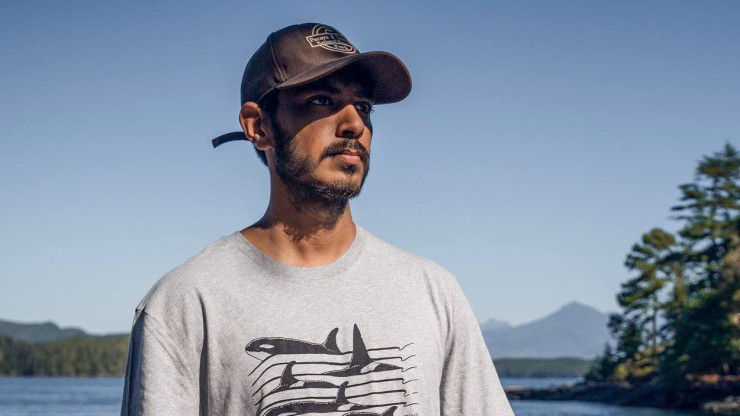“My travels brought me closer to nature, but they also brought me closer to the people who are out there working with it.”

The Call of the Wild
On a few evenings last summer, Kabir Menon, C’25, slept overnight at the research station where he was interning. He was dedicated to his work, but that was not the reason for his unconventional sleepover. “A grizzly bear had been spotted hanging around our normal campsite,” Menon explains, “and we had to wait for him to go on his way.”
A research intern for OrcaLab, Menon spent the summer in the remote environs of Hanson Island, a small island off the coast of British Columbia. The calm waters of the Queen Charlotte Strait and plentiful salmon on which to feed attract groups of orca whales each summer, and the OrcaLab team stays active 24 hours a day to observe and record all of the action.
Using a massive network of hydrophones (underwater microphones that record sound in all directions) and cameras, the researchers identify the whales, listen in on them, and track and record their movements and behaviors. If one microphone in the system picks up the sound of an approaching whale, available staff rush to the lab to start the recording and make note of the type of whale call heard, its location, and which specific whale was present.
For Menon, it was a perspective-altering experience. “I went from seeing my first whale to being able to identify individuals with their own unique personalities,” he says. “This personal connection rescaled my perspective on their conservation, shifting my focus from populations to each curious individual as they revealed more about their lives to me.”
Getting that new perspective, though, was something of an exercise in the extreme. The OrcaLab research station was one of just two sites on the island with full-time inhabitants, which meant that the researchers had access to little traditional infrastructure. They camped in tents all summer long—barring the odd grizzly bear-induced hiatus—and sometimes had to wait up to 10 days for enough rainwater to collect to be able to take a shower. The nearest grocery store was a 40-minute boat ride away.
It was a unique environment for learning, but Menon wouldn’t have it any other way. In just the past year, his accumulated Sewanee experiences include a fall semester abroad spent deep in the Peruvian Amazon, where he camped in a cabin while researching birds—and where at one point, because of a flood, he had to evacuate the campsite alongside a flurry of fleeing snakes and tarantulas. In the spring, his Carey Fellowship led him to an internship at an engineering consulting firm in Senegal where he worked on projects involving sanitation and sustainability.
Now back on campus, Menon is still reflecting on those various experiences and seeing how they fit together. As a biology major and business minor with a concentration in the environment and sustainability, he’s grateful for the opportunity to explore his interests from a truly global vantage point. And as someone interested in forging a career at the intersection of those interests, the chance to travel the world in pursuit of greater understanding was invaluable.
“My travels brought me closer to nature, but they also brought me closer to the people who are out there working with it,” says Menon. “Those connections and the knowledge they shared will be beneficial no matter what path I ultimately take.”

